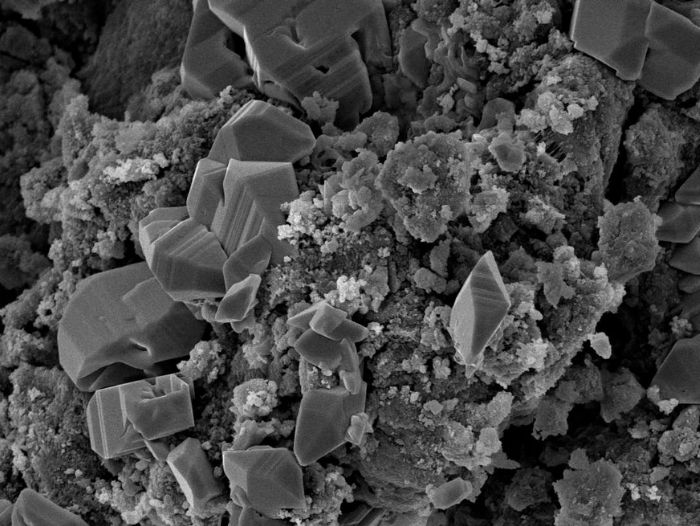
PhotonHub Europe: innovate with the technology of light!
May 18, 2023
Multifunctional biodegradable aerogels as an alternative to plastic
May 29, 202322/05/2023
Researchers in the Polymer Materials and Textile Chemistry (POLQUITEX) research group of the Department of Chemical Engineering at the Universitat Politècnica de Catalunya - BarcelonaTech (UPC) participate in the WAVE project, who aim is to recycle elastomeric waste (such as tyres and scraps from building roofs), for its subsequent reuse and recovery in various industrial sectors (automotive, civil, electrical).
In WAVE, a devulcanizing process has been developed, so that this elastomeric waste can be integrated in production processes, and the recycled material can be used in the same way as the original material.
The project is a new development of the group’s research line. This has progressed from mixing ground tire rubber with thermoplastics, to devulcanization, a process that enables a further step to be taken in the possibilities of reusing and recovering this waste, in line with the concepts of the circular economy and sustainability.
WAVE is designed to contribute to reducing the over 20 million tonnes of elastomeric waste that is generated every year worldwide and to minimising the amount of this waste that is still dumped in landfill. To achieve this, elastomeric waste is recovered and recycled through environmentally friendly processes of devulcanization. These involve thermal and mechanical processes, electromagnetic radiation and chemical agents at low temperature. The process is optimised depending on the type of elastomer waste. In addition, the industrial viability of the results obtained in the various devulcanization processes will be assessed through characterization techniques.
The project is relevant, considering its link to the new Spanish national plan on waste management (PEMAR) 2016-2022, which sets guidelines for waste management in Spain in the coming years and complements the Spanish Waste Prevention Programme 2014-2020. This programme includes many of the objectives to which the Spanish government made a commitment at the Glasgow COP26 (2021) summit on decarbonization of the planet.
Results and impact
The WAVE project is expected to promote:
- Understanding the influence on the devulcanization process of the most commonly used additives in elastomers: carbon and silicon dioxide.
- Integration of devulcanized waste in manufacturing processes through mixes with virgin elastomers to produce components that are similar to the original ones.
- Formulation of mixtures using percentages of devulcanized elastomer of between 30 and 70% to obtain equivalent properties to those of the initial elastomer.
- Understanding of the electrical behaviour of these materials for potential high-added value applications.
- Study of the properties obtained through the various mixes of devulcanized elastomer with virgin elastomer and assess the viability in various industrial sectors (automobile, civil, packaging, electrical).
Budget and funding
The project has a budget of €96,800 and has obtained funding through the ‘State Plan for Scientific and Technical Research and Innovation 2017-2020’ (Spanish State Research Agency). Its duration is three years (September 2022 – August 2025).
You want to know more?
Related Projects
- The Visualisation, Virtual Reality and Graphic Interaction Research Group (ViRVIG) at the Universitat Politècnica de Catalunya - BarcelonaTech (UPC) has participated in the XR4ED project, an initiative that connects the educational technology (EdTech) and Extended Reality (XR) sectors, with the aim of transforming learning and training across Europe.
- The inLab FIB at the UPC has collaborated with Lizcore® for the development of a proof of concept based on artificial intelligence to improve safety in climbing with autobelay devices. The system allows the automatic and accurate detection of risk situations before starting a route.
- Researchers from the Centre for Image and Multimedia Technology of the UPC (CITM) and from the DiCode research group (Digital Culture and Creative Technologies Research Group) of the Universitat Politècnica de Catalunya – BarcelonaTech (UPC) have worked on the project The Eyes of History, an initiative of the Catalan Agency for Cultural Heritage that offers an immersive view of Catalan cultural heritage. It is especially aimed at the first and second cycles of secondary education and was created to bring heritage into the classroom. Its goal is to bring the history and monuments of Catalonia closer in a vivid and innovative way, using tools such as virtual reality and new museographic narratives.
- City and Play is a social action project coordinated by researchers from the Centre for Image and Multimedia Technology (CITM) and the DiCode research group (Digital Culture and Creative Technologies Research Group) of the Universitat Politècnica de Catalunya – BarcelonaTech (UPC), the Universitat Oberta de Catalunya (UOC) and the University of Barcelona (UB), and funded by Barcelona City Council. The aim of the project is to promote civic competences and reflection on the urban environment among adolescents through the creation of an open framework that uses methodologies based on play, co-creation and storytelling.









